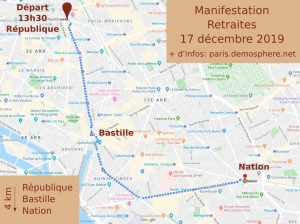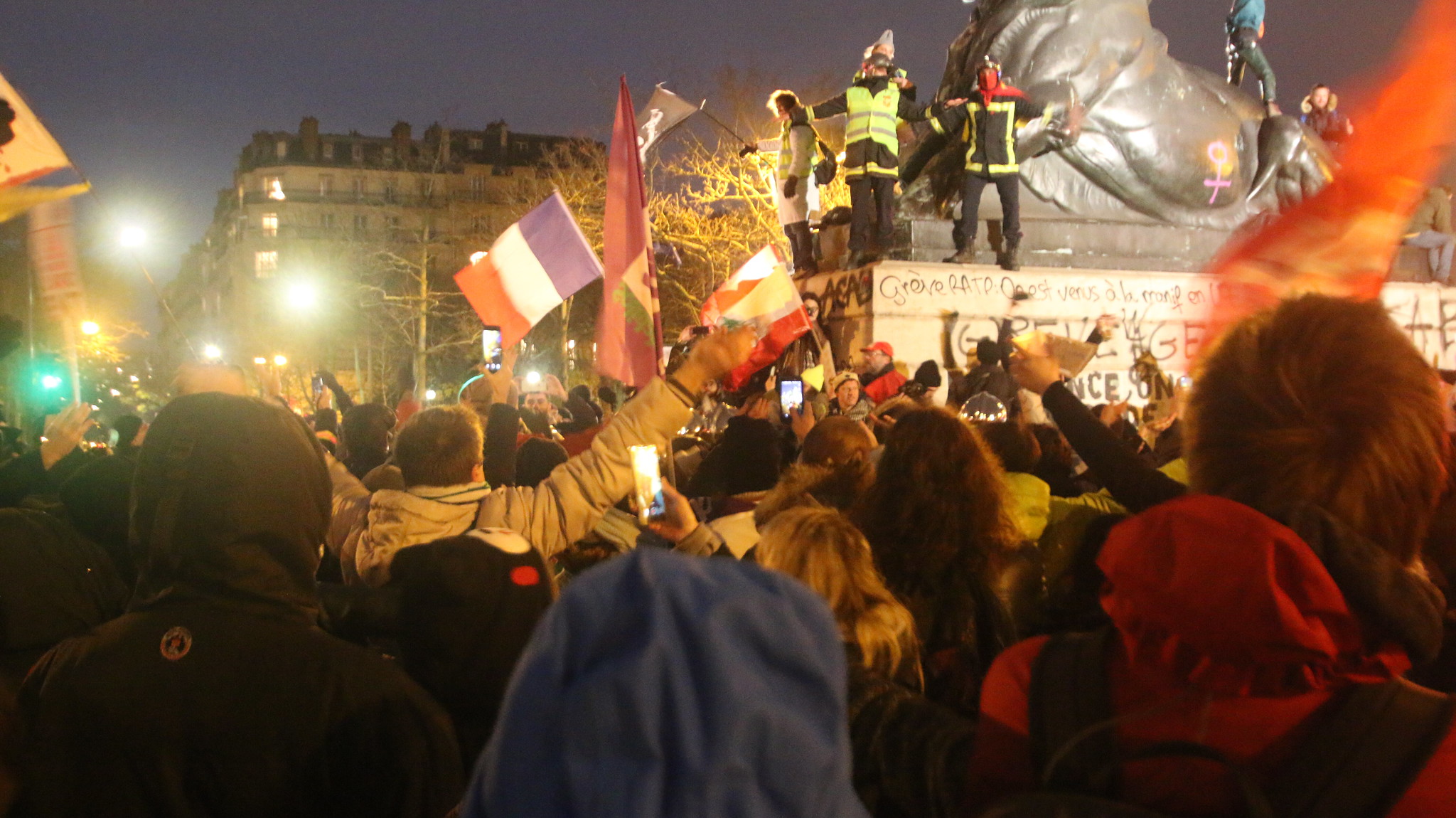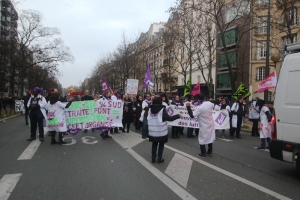It’s Une Wonderful Strike
Last year, eight million people got on SNCF trains in France and went to visit their loved ones for Christmas. This year, a week before Christmas, almost no trains are running at all. France is paralyzed in a general strike against sweeping and nebulous changes to the social support system that would ripple down through generations. Despite the threat of damaging Christmas, the strike is supported by 54% of the French public, according to polling yesterday.
France is having a moment.
 At the time of this writing, a crowd of protestors is spread, thickly and thinly, across a protest route that stretches from La Republique through the Bastille to la Nation. Firefighters are being teargassed and beaten by police. A university president is trying to move the CRS police force out of the way.
At the time of this writing, a crowd of protestors is spread, thickly and thinly, across a protest route that stretches from La Republique through the Bastille to la Nation. Firefighters are being teargassed and beaten by police. A university president is trying to move the CRS police force out of the way.
This is the latest protest in the ongoing strike against Macron’s pension reforms, a strike that’s paralyzed the transport system, made firefighters into protest heroes, and recently welcomed some Paris waste workers to the ongoing general strike, which, depending on how much waste workers strike, could make for a fragrant holiday.
Today protestors stood before the police and chanted that they wanted the same retirement plan as the police — a reference to the Macron promising the police a better pension than anyone else, to keep them in the street enforcing his order.
Strikes are not wholly discrete or singular things in France, and this one is no different. Healthcare workers have been on strike for months in France – but it’s illegal for them to actually strike in the not-working sense, so they’ve worn armbands to indicate their strike status and went on helping patients. It’s a move the government has safely ignored and will probably continue to. It’s also not legal for firefighters to strike, or to wear their gear in protests, to which the firefighters have responded with roughly the attitude “You and whose army?” Schools are striking a few days a week, as are some libraries and museums. Radio France, the public broadcaster, is on partial strike and some days have more or less material coming out. SNCF and RATP, national and Parisian transit respectively, are on strike with two metro lines and a few buses occasionally working in Paris, and few trains running nationally at all. Even the CRS police force had a thousand person blue flu recently, leaving the military Gendarmarie to monitor the protests.
The strike is currently unlimited, and the unions are prepared to go through January, unless the government gives in and cancels its pension reform plans. The pensions are complicated — there are different plans for miners and sailors, public utility workers an hospital employees, and even Catholic priests in Alsace-Lorraine, who are still paid by the government for reasons having to do with post WWI treaties. (French politics and law can be weird. French legal exceptions have legal exceptions.)
But as arcane is it is, these protests are not just about pensions. They are full of Gilets Jaunes, the weekly protests that have plagued the government for more than a year, which began as a protest of a fuel tax but are largely about inequality and the curtailed opportunities for the poor and rural. They have the usual Black Bloc and Parisian anarchists. The protests are as much about the Macron government doing anything as they are about the Macron government reforming pensions specifically. Macron is deeply unpopular, trailing the general strike threatening to ruin Christmas by by 20 point at a 34% approval rating. But with him, neoliberalism is also unpopular, and that’s what Macron represents.
The government has said nothing since their minister of pension reform resigned under a corruption scandal. The next meeting with the unions and the Prime Minister about the pension reform is scheduled for tomorrow with an announcement to follow. France will be getting ready for Christmas, wrapping gifts, buying food and wine, and waiting in the streets.
My work for Emptywheel is supported by my wonderful patrons on Patreon. You can find out more, and support my work, at Patreon.





c’est la pagaille totale… (roughly translated as what a clusterf*ck)
The historical wording is la chienlit.
Almost literally “shitting the bed”. Not to be confused with pissenlit (dandelion)…
..which does have diuretic properties, hence the aptly found name. Maybe demonstration are an age old remedy against constipation.
(of the government)
did not know that! thx
if “in vino veritas”, then how do we explain dandy lyin’ wine? :~)
c’est l’exception qui fait la regle.
For a more nuanced picture, I recommend this text by Regis Debray about republican vs. social democrat, in the French context. It is from 1989, but it still applies, the divide is the same. I am pointing this out, because this is probably what you are trying to portray.
I am not a fan at all of the gilet jaunes. And they try to mingle in the demonstrations, but they are not welcomed, This all idea that Macron is an illegitimate president is sickening. He won with a very large margin, thankfully, and then his newly form group of mostly novice obtained a very confortable majority at the parliament. The European elections, for all the talk of his deep unpopularity, did not go that badly for a sitting president. There is something conspiracist in these virulent attacks on Macron (the footman of international finance and big money etc.). Trumpeteers wouldn’t say it any differently.
I’ve been there, a lot, and the gilets jaunes are in fact quite welcome. It’s not universal, but I think there’s a lot less sunlight between them and a lot of union folk than there used to be. Macron beat… LePen, which I fear he might not next time, given his abysmal approval ratings and his refusal to acknowledge the lack of mandate he really had. He had the highest rate of blank balloting ever. That was a moment for humility, not talking about how France really wants a king.
And the Parliament? Was it not a landslide?
Macron best Le Pen, but also the hard left —which shamefully called for the spoiled ballots you talk about — the usual right wing and the socialists.
Contrary to your belief, Melenchon (hard left) isn’t popular. Please look at his declarations w.r.t Russia and Russian opponents, such as the one killed in from of the Kremlin. There is no daylight between him and Le Pen when it comes to Putin & Russian interests. That makes him being a no thanks for a number of people.
This is a very weird conversation. I don’t think Melenchon is popular, or politically relevant, and neither are the Russians. If you want your boy to beat Le Pen, he’s going to need some humility and to stop antagonizing and dismissing his own people.
This type of protest are needed in Amerika but sadly would met hail of bullets. It would not only be about the potus but the puppets masters that control the govt.
Thanks for the report Quinn Norton
This was a very interesting read Quinn Norton. I hope you give us updates. I care.
More fantastic reporting – thank you Quinn…
I am sorry if I am repeating anything Quinn has covered elsewhere, but something to bear in mind is that France employs something like 25% of the workforce in the public sector (in the United States it’s about 20-20.2%). So when the French President acts in a way that provokes resistance from all public sector employees (the potential scope of impact), then he is basically risking an argument with 1 in 4 of the entire national workforce. This is easily sufficient to bring the nation to a standstill, despite the laws that “prevent” certain professions from striking, as Quinn notes.
This might be reading too much between the lines, but I get the sense that France is setting itself up for a prolonged, punishing attack on workers and workers rights, exactly the sort of thing that the UK went through in the 1980s. Back then the very right-wing government of the day, led by Margaret Thatcher, picked a very careful fight with one of the most militant unions in the country, the Coal Miners.
With the benefit of being able to look back over that historical record, we now know that the government of the day planned the strike meticulously, prepared for it [shipping in foreign coal reserves for power stations, for example, stockpiling coal in advance] and ground the miners down through a combination of attrition and what rapidly became some rather brutal police tactics. Then, as is now the case for France, the police were paid massive sums of overtime to hold the line.
The strike itself was stage-managed through television and portrayed almost entirely in terms of the disruption it was causing the nation. The “public mood” was carefully fed information, stage-managed TV footage and ultimately turned against the miners.
In the wake of the strike, the government used the events of the strike to enact sweeping laws. Trades Unions were basically neutered, legally, but more importantly they were undercut socially. Being a member of a Trades Union came to be portrayed as some kind of national traitor, some kind of closet communist.
Although no company in the UK would, even now, stand up and say that they would prohibit union membership, the truth is that Trades Unions have zero power. You don’t for one moment think that Amazon could get away with treating staff in their “fulfillment centers” the way that they do if there was any union represenation, do you?
Much as the disruption is going to annoy the average non-public-sector French citizen, I hope that those people can see the bigger picture and that they understand that their entire future is at stake.
It is indeed reading too much into it. Macron isn’t Thatcher. His government doesn’t try to de-unionise the country. The gilet jaunes do. One of the unions, CFDT, which isn’t a make believe union but one of the big 4, actually backs most of reform.
It just isn’t the fight of good vs evil that Quinn Norton tries to paint. I did go to march on the biggest one the far, 05/12. This is normal political debate here. But I might vote again for Macron. Because there is no credible alternative and I don’t believe in mob rule.
It seems possible that mob rule is not the only alternative to another Macron administration.
Here is a sadly topical example of what can happen in a country where workers’ rights are suppressed:-
https://yro.slashdot.org/story/19/12/17/229233/engineer-says-google-fired-her-for-browser-pop-up-about-worker-rights
If M. Macron can find $250 million to “makeover” one roadway in Paris, he will find it harder to convince pensioners to take a haircut because – uniformity and simplicity.
M. Macron wants his makeover of the Champs-Elysees to be paid for with both public and private money. That furthers the neoliberal catechism of privatization by giving private interests a say in public works. As it happens, locals apparently avoid the Champs-Elysees. It is used mainly by tourists, those commuting through at a gallop, and the tons of military hardware paraded through each Bastille Day. Which means the money will benefit tourists and tourism.
Were M. Macron to use the money, instead, to reduce Paris’s high levels of pollution – which is causing much of the damage his project would repair – he would have an easier time convincing pensioners that his reforms have their interests at heart. (BTW, whatever happened to abating the pollution caused by the two hundred tons of lead that burned away in the Notre Dame fire?)
https://www.theguardian.com/world/2019/dec/18/its-a-little-worn-paris-champs-elysees-in-line-for-250m-make-over
https://www.livescience.com/65451-notre-dame-sky-high-lead-levels.html
w.r.t. lead, they are still decontaminating, or trying to find how to. The cafes and tourist shops on the island are closing, apparently .
A decade ago I attended a 10:00 am Sunday church service at the American Cathedral on Avenue George V, a couple of blocks off the Champs-Elysée. There was a long line outside one of the designer stores on the Champs, the Louis Vuitton, I think. When I left after service and the coffee service that followed, the line was still there. We never went back except to watch the Tour de France come in.